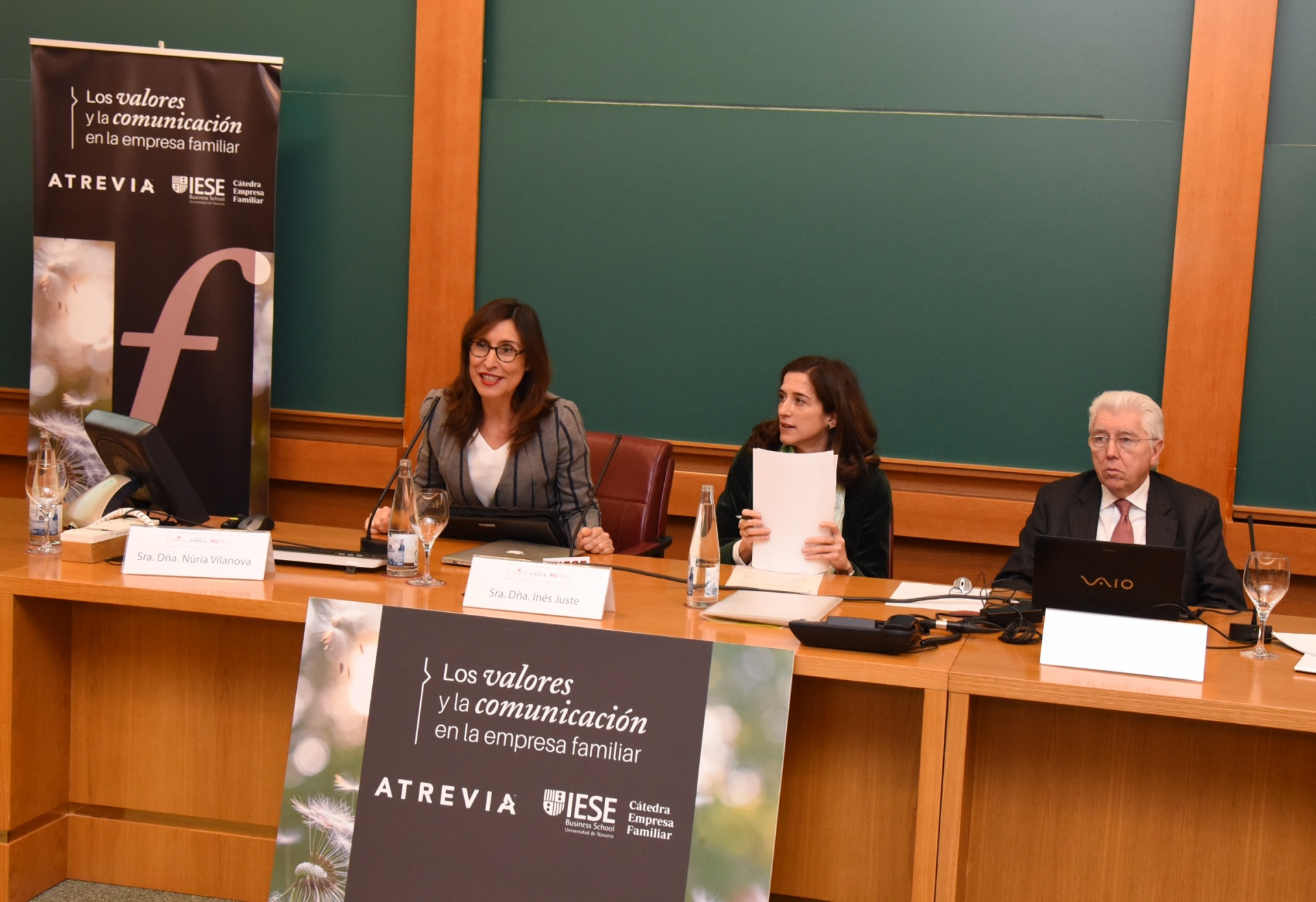
Own cultural strength and long term vision are the two biggest competitive advantages in a family business and the reason for its survival. This is the main conclusion from the study “communication and values in a family business”, elaborated by ATREVIA and the Chair of Family Businesses from the IESE Business School that was presented today in Madrid.
“The transmission of fundamental values to the following generations marks the success or the failure of family businesses in the next generation”, assured the lecturer from IESE Business School Josep Tàpies and coauthor of the study. “Reputation is key for the company and it marks a great level of demand for family behaviors and the consideration of ethics as a requirement to safeguard the future of the family and the business”, according to founder and president of ATREVIA, Núria Vilanova.
The study “communication and values in a family business” analyzes how to avoid the difficulties in family businesses from Spain, Portugal and Latin America. From the conclusions highlighted today and also from the traditional generational differences that always affect a family businesses, there exists a series of contemporary barriers; geographic dispersion of families, growth of businesses and the lack of time. It’s about the conditions that they have to face by investing time and attention to the younger members of the family.
Consultant family businesses are finding efficient formulas to overcome these barriers through performance protocols (71% of the companies have one written up) and governmental organs that link family with the business: Family Advisers (56.3% have them implemented), Family Office (30%) and Family Assembly (38.8%).
In the presentation of the report that took place in the headquarters of IESE Business School in Madrid, Núria Vilanova, founder and president of ATREVIA and Josep Tàpies, chairperson of Family Business in IESE Business School participated as drivers of the project. The event also counted on the presence of Inés Juste, president of the Association to Develop Family Businesses in Madrid (ADEFAM).
Núria Vilanova highlighted the role of “family businesses as one of the pillars in our country. The transmission and maintenance of values as an essential element is within a process in which communication plays a key role”. For his part, the lecturer Josep Tàpies stated that “values are the nucleus of all business culture but in family businesses they are also the symbol that links the business with the family and are basis of management. The study analyzes the role of communication in its transmission by generation to generation”.
Finally, Inés Juste pointed out that “the success and therefore the survival of family businesses are located in the fact that the family remains united. To achieve this, families have to learn to communicate and so they should create the necessary mechanisms for this. Due to the fact that communication in a family business is more complicated than in a non family one, emotions should become a link families and professionals”.
For the development of the study “values and communication in a family business”, it held the participation of 30 directors of Spanish family businesses like Grupo GAES, Grupo Pascual, Grupo Osborne, Freixenet, Codorniú Raventós, Damm, Grupo GFM, Grupo CELSA, Grupo Juste, Dispur and Luis Simöes.
Likewise, Latin American companies to the size of Ibáñez, Lo Campino, Grupo Montecristo, Organización Carvajal, Luksic, Grupo San Miguel, Grupo Kuljis, Grupo Chemo, Maahsa, Grańa and Montero, Alquería and Grupo Jari participated in the study. This shows that they have been involved with Mexican corporations like TUK, Acosta Verde, Banco Base, Corporación EG, Proeza, Interprotección Agente de Seguros y Fianzas and Grupo Kaluz.
A quantitative analysis was completed with data collected from answers of nearly 3,000 recipients who are members of Spanish, Portuguese or Latin American family businesses. The survey was also available on the web in Family Business in the IESE.
Transmission of Values and Communication
The report “values and communication in a family business” extracts conclusions at the time of analyzing the role of communication in the business environment linked with family. Some results included; 90% of respondents signaled that family values reflect the corporate values and they are essential (87%) at the time of taking decisions and establishing strategies. In this sense, strategically planned communications linked to business objectives are fundamental to keep the relationship alive between identities and values. Therefore, 80% of business people admit that formal communication contributes in a positive way to the evolution and growth of a company.
Nevertheless, the study shows that these types of organizations who don’t take advantage of the potential for communication to stimulate their business, reputation and image are not taking the right approach. 81% of directors consider that it is about a tool that helps to transmit values of a family business and 76% do not have a specific protocol available for the management of communication with the media or with other interest groups. In this way, between the challenges that family businesses face, one finds the definition of strategic plans and protocols that allow fluent communication across bidirectional channels.
The study follows the values in a family that are an aspect differentiation that positively influences the reputation of a company in the face of competition and repercussions also in the commitment of employees. In this sense, the example is essential. Communication is converted therefore into an essential tool to show this example not only to the members of the family but to all and every one of the employees and in conjunction with society.
Finally, it states that in 60% of the cases, the incorporation of families in a business is established by a formalized protocol.